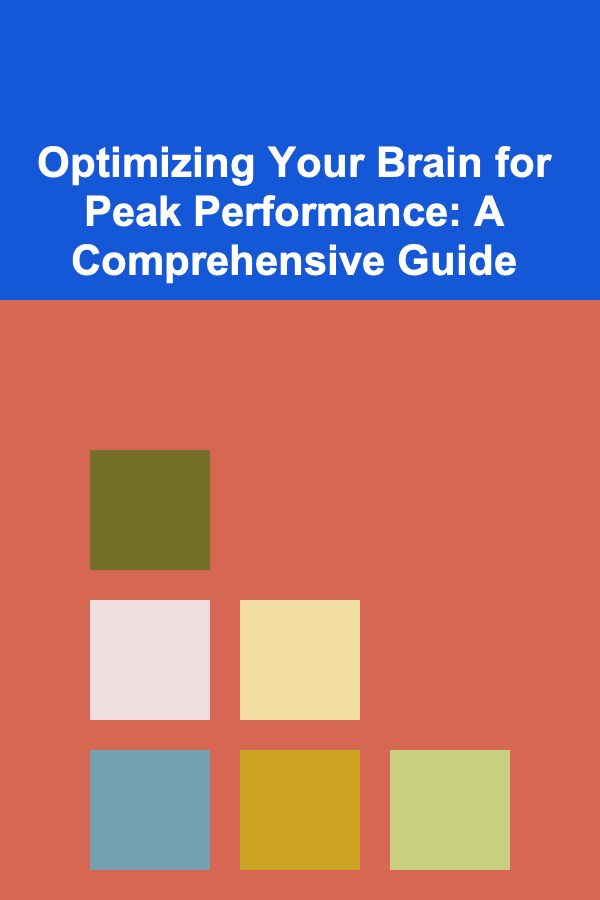
Optimizing Your Brain for Peak Performance: A Comprehensive Guide
ebook include PDF & Audio bundle (Micro Guide)
$12.99$9.99
Limited Time Offer! Order within the next:

The human brain, a marvel of biological engineering, is the control center for everything we do, think, and feel. Achieving peak performance from this complex organ requires a multifaceted approach that encompasses lifestyle, nutrition, cognitive training, and a deep understanding of its inner workings. This guide explores proven strategies and techniques to unlock your brain's full potential, allowing you to enhance focus, memory, creativity, and overall cognitive function.
I. Understanding the Brain: A Foundation for Optimization
Before embarking on any optimization journey, it's crucial to understand the basic structure and function of the brain. The brain is composed of billions of neurons, interconnected through synapses, constantly communicating and forming neural networks. Different regions are responsible for specific functions, and understanding these regions can help target optimization efforts more effectively.
A. Key Brain Regions and Their Functions:
- Prefrontal Cortex (PFC): Responsible for executive functions such as planning, decision-making, working memory, and impulse control. Optimizing the PFC is crucial for focus, productivity, and goal achievement.
- Hippocampus: Plays a critical role in memory formation, spatial navigation, and learning. Improving hippocampal function is essential for retaining information and acquiring new skills.
- Amygdala: Processes emotions, particularly fear and anxiety. Managing amygdala activity is important for emotional regulation and reducing stress.
- Basal Ganglia: Involved in motor control, habit formation, and reward processing. Optimizing the basal ganglia can enhance efficiency and automate desired behaviors.
- Cerebellum: Coordinates movement, balance, and motor learning. Improving cerebellar function can enhance coordination and skill acquisition.
B. Neuroplasticity: The Brain's Ability to Adapt
One of the most remarkable features of the brain is its plasticity, the ability to reorganize itself by forming new neural connections throughout life. This means that our brains are not fixed; we can actively shape and remodel them through our experiences and behaviors. Neuroplasticity is the foundation for learning, adaptation, and cognitive improvement. The principle, often summarized as "neurons that fire together, wire together," underscores the importance of consistent practice and repetition in strengthening neural pathways.
II. Lifestyle Factors: The Pillars of Brain Health
A healthy lifestyle provides the foundation for optimal brain function. Neglecting these fundamental aspects can significantly impair cognitive performance, regardless of other optimization efforts.
A. Sleep: The Brain's Recovery and Consolidation Period
Sleep is not merely a period of rest; it's an active process essential for brain health. During sleep, the brain consolidates memories, clears out toxins, and repairs damaged cells. Chronic sleep deprivation impairs cognitive function, reduces attention span, and increases the risk of neurodegenerative diseases. Aim for 7-9 hours of quality sleep per night. Strategies for improving sleep include:
- Establishing a consistent sleep schedule: Going to bed and waking up at the same time each day, even on weekends, helps regulate the body's natural sleep-wake cycle (circadian rhythm).
- Creating a relaxing bedtime routine: Engage in calming activities such as reading, taking a warm bath, or listening to soothing music.
- Optimizing the sleep environment: Ensure the bedroom is dark, quiet, and cool.
- Avoiding caffeine and alcohol before bed: These substances can disrupt sleep patterns.
- Limiting screen time before bed: The blue light emitted from electronic devices can interfere with melatonin production, a hormone that regulates sleep.
B. Nutrition: Fueling the Brain for Optimal Performance
The brain requires a constant supply of nutrients to function optimally. A balanced diet rich in whole foods, healthy fats, and antioxidants is essential for brain health. Key nutrients for brain function include:
- Omega-3 Fatty Acids: Found in fatty fish (salmon, tuna, mackerel), flaxseeds, and walnuts, omega-3s are crucial for brain cell structure and function. They have been shown to improve memory, focus, and mood.
- Antioxidants: Found in fruits, vegetables, and berries, antioxidants protect brain cells from damage caused by free radicals. Examples include blueberries, spinach, and dark chocolate.
- B Vitamins: Essential for energy production and nerve function. Good sources include whole grains, meat, and leafy green vegetables. Vitamin B12 is particularly important for cognitive function and deficiency can lead to neurological problems.
- Choline: A precursor to acetylcholine, a neurotransmitter involved in memory and learning. Found in eggs, liver, and soybeans.
- Magnesium: Plays a role in nerve transmission and brain plasticity. Found in leafy green vegetables, nuts, and seeds.
Furthermore, maintaining stable blood sugar levels is crucial for consistent brain function. Avoid processed foods, sugary drinks, and excessive carbohydrates, which can lead to blood sugar spikes and crashes. Focus on consuming complex carbohydrates with a low glycemic index, such as whole grains, legumes, and vegetables.
C. Exercise: Boosting Blood Flow and Brain-Derived Neurotrophic Factor (BDNF)
Regular physical activity is not only beneficial for physical health but also for brain health. Exercise increases blood flow to the brain, delivering oxygen and nutrients essential for optimal function. It also stimulates the production of BDNF, a protein that promotes the growth and survival of brain cells. BDNF plays a crucial role in learning, memory, and neuroplasticity.
Aim for at least 30 minutes of moderate-intensity exercise most days of the week. Activities such as brisk walking, jogging, swimming, or cycling are all beneficial. Even short bursts of high-intensity interval training (HIIT) can have a significant impact on brain function.
D. Stress Management: Protecting the Brain from Cortisol's Damaging Effects
Chronic stress can have detrimental effects on the brain. When stressed, the body releases cortisol, a stress hormone that can impair cognitive function, shrink the hippocampus, and increase the risk of depression and anxiety. Effective stress management techniques are essential for protecting the brain from these damaging effects.
Strategies for managing stress include:
- Mindfulness Meditation: Focusing on the present moment without judgment can reduce stress and improve attention span.
- Deep Breathing Exercises: Slow, deep breaths can activate the parasympathetic nervous system, which promotes relaxation.
- Yoga: Combines physical postures, breathing techniques, and meditation to reduce stress and improve overall well-being.
- Spending Time in Nature: Exposure to nature has been shown to reduce stress and improve cognitive function.
- Social Connection: Spending time with loved ones can provide emotional support and reduce feelings of isolation.
- Prioritizing Self-Care: Engage in activities that you enjoy and that help you relax, such as reading, listening to music, or spending time on hobbies.
III. Cognitive Training: Sharpening Mental Skills
Just as physical exercise strengthens the body, cognitive training strengthens the brain. Engaging in mentally stimulating activities can improve cognitive function, enhance neuroplasticity, and protect against cognitive decline. The key is to choose activities that are challenging and engaging.
A. Brain Training Games and Apps: A Modern Approach to Cognitive Enhancement
A variety of brain training games and apps are available that target specific cognitive skills, such as memory, attention, and problem-solving. While the effectiveness of these programs is still debated, some studies have shown that they can improve cognitive function, particularly when used consistently and tailored to individual needs.
Examples of popular brain training games and apps include:
- Lumosity: Offers a variety of games designed to improve memory, attention, and processing speed.
- CogniFit: Provides personalized brain training programs based on cognitive assessments.
- Elevate: Focuses on improving language skills, such as reading comprehension and writing.
- Peak: Offers a range of games designed to challenge different cognitive abilities.
It's important to choose brain training programs that are evidence-based and that focus on skills that are relevant to your goals. Also, it's crucial to use these programs consistently and to gradually increase the difficulty of the tasks to continue challenging the brain.
B. Learning New Skills: Expanding Neural Networks
Learning new skills is one of the most effective ways to stimulate brain growth and enhance neuroplasticity. When you learn something new, your brain forms new neural connections and strengthens existing ones. The more challenging and complex the skill, the greater the impact on brain function.
Examples of activities that can promote brain growth include:
- Learning a new language: Improves memory, attention, and problem-solving skills.
- Playing a musical instrument: Enhances coordination, creativity, and cognitive function.
- Taking up a new hobby: Provides mental stimulation and promotes social connection.
- Reading: Expands vocabulary, improves comprehension, and stimulates imagination.
- Traveling: Exposes you to new cultures and experiences, challenging your perspective and broadening your horizons.
The key is to choose activities that you find enjoyable and that are challenging enough to push you outside of your comfort zone. Don't be afraid to try new things and to embrace the learning process.
C. Mindfulness and Meditation: Cultivating Focus and Reducing Mind-Wandering
Mindfulness and meditation practices can significantly improve attention span, reduce mind-wandering, and enhance overall cognitive function. By training the mind to focus on the present moment without judgment, you can strengthen the neural pathways associated with attention and concentration. Meditation can also reduce stress and anxiety, further improving cognitive performance.
Different types of meditation practices exist, including:
- Mindfulness Meditation: Focusing on the breath, body sensations, or thoughts and emotions as they arise, without judgment.
- Loving-Kindness Meditation: Cultivating feelings of compassion and kindness towards oneself and others.
- Transcendental Meditation: Using a mantra to quiet the mind and promote relaxation.
- Walking Meditation: Paying attention to the sensations of walking, such as the feeling of your feet on the ground.
Start with short meditation sessions (5-10 minutes) and gradually increase the duration as you become more comfortable. Consistency is key; even a few minutes of daily meditation can have a significant impact on cognitive function.
D. Deliberate Practice: Targeted Skill Improvement
Deliberate practice, as popularized by Anders Ericsson, involves focused, systematic effort to improve a specific skill. It goes beyond simply repeating a task; it requires identifying weaknesses, seeking feedback, and focusing on areas that need improvement. This approach is highly effective for developing expertise and optimizing cognitive performance.
Key elements of deliberate practice include:
- Specific Goals: Clearly define what you want to achieve.
- Focused Attention: Concentrate intently on the task at hand.
- Feedback: Seek feedback from experts or mentors to identify areas for improvement.
- Repetition: Practice consistently and deliberately, focusing on improving specific skills.
- Reflection: Analyze your performance and identify what worked well and what needs improvement.
Deliberate practice is not always enjoyable, but it is highly effective for developing expertise and achieving peak performance in any domain.
IV. Advanced Strategies: Exploring the Frontiers of Brain Optimization
Beyond the foundational strategies, several advanced techniques are being explored for their potential to enhance brain function. These techniques often require expert guidance and further research is needed to fully understand their long-term effects.
A. Nootropics: Cognitive Enhancing Substances
Nootropics, also known as "smart drugs," are substances that are claimed to enhance cognitive function. They can range from natural supplements to prescription medications. While some nootropics have shown promising results in improving memory, attention, and other cognitive functions, it's important to approach them with caution and to consult with a healthcare professional before using them.
Examples of commonly used nootropics include:
- Caffeine: A stimulant that can improve alertness and focus.
- L-Theanine: An amino acid found in green tea that can promote relaxation and reduce anxiety. Often combined with caffeine.
- Creatine: An amino acid that can improve muscle strength and cognitive function.
- Piracetam: A synthetic nootropic that is claimed to improve memory and learning. Requires a prescription in some countries.
- Modafinil: A prescription medication used to treat narcolepsy, but also used off-label to improve wakefulness and focus. Requires a prescription.
It's important to research any nootropic thoroughly before using it and to be aware of potential side effects and interactions with other medications. Prioritize lifestyle interventions before considering nootropics.
B. Neurofeedback: Training Brainwaves for Optimal Performance
Neurofeedback is a type of biofeedback that involves monitoring brainwave activity and providing real-time feedback to help individuals learn to regulate their brainwaves. It has been used to treat a variety of conditions, including ADHD, anxiety, and depression, and has also been explored as a tool for cognitive enhancement.
During neurofeedback sessions, electrodes are placed on the scalp to measure brainwave activity. The individual then receives feedback, typically in the form of visual or auditory signals, that indicates whether their brainwave activity is within the desired range. Over time, the individual learns to consciously control their brainwaves and to improve their cognitive function.
Neurofeedback is a complex and specialized technique that should be administered by a qualified professional.
C. Transcranial Magnetic Stimulation (TMS): Non-Invasive Brain Stimulation
Transcranial Magnetic Stimulation (TMS) is a non-invasive technique that uses magnetic pulses to stimulate or inhibit brain activity. It has been used to treat depression, anxiety, and other neurological conditions, and is being explored as a potential tool for cognitive enhancement.
During TMS, a magnetic coil is placed on the scalp, and magnetic pulses are delivered to specific brain regions. These pulses can either increase or decrease the activity of neurons in the targeted region. TMS is generally considered to be safe, but it can have side effects, such as headaches and seizures.
TMS is a medical procedure that should only be performed by a qualified professional.
D. Virtual Reality (VR) for Cognitive Rehabilitation and Training
Virtual Reality (VR) technology offers immersive and interactive environments that can be used for cognitive rehabilitation and training. VR can simulate real-world scenarios, allowing individuals to practice cognitive skills in a safe and controlled environment. This is particularly useful for individuals recovering from brain injuries or those seeking to improve specific cognitive functions like spatial awareness, memory, and attention.
VR applications in cognitive training include:
- Memory training: Simulating environments like supermarkets or familiar routes to improve recall and navigation.
- Attention training: Presenting complex tasks in VR to enhance focus and reduce distractions.
- Executive function training: Designing scenarios that require planning, problem-solving, and decision-making.
VR-based cognitive training is showing promise as a valuable tool for improving cognitive function and enhancing neuroplasticity. Further research is needed to fully understand its potential and optimize its application.
V. Building a Personalized Brain Optimization Plan
Optimizing your brain for peak performance is a personal journey. The strategies that work best for one person may not work for another. The key is to experiment with different techniques, track your progress, and adjust your plan accordingly. Consider these key steps:
- Assess Your Baseline: Identify your strengths and weaknesses. Consider taking a cognitive assessment to get a baseline measure of your cognitive function.
- Set Realistic Goals: Focus on specific, measurable, achievable, relevant, and time-bound (SMART) goals.
- Prioritize Lifestyle Factors: Focus on improving your sleep, diet, exercise, and stress management.
- Incorporate Cognitive Training: Choose activities that are challenging and engaging.
- Track Your Progress: Monitor your cognitive function and adjust your plan as needed.
- Be Patient and Persistent: Brain optimization is a long-term process. Don't get discouraged if you don't see results immediately.
- Consult with Professionals: Talk to your doctor, a neuropsychologist, or a qualified brain trainer to get personalized guidance.
Ultimately, the goal of brain optimization is to enhance your quality of life and to help you achieve your full potential. By understanding the principles of brain function, adopting healthy lifestyle habits, and engaging in targeted cognitive training, you can unlock your brain's power and live a more fulfilling and productive life.
"The brain is wider than the sky." - Emily Dickinson

How to Earn Passive Income by Teaching Deep Learning Online
Read More
How to Make Use of Dead Space in Your Home for Extra Storage
Read More
How to Stage Your Kitchen to Highlight Its Best Features
Read More
How to Reduce Sauces for Concentrated Flavor
Read More
How To Pick the Perfect Action-Adventure Novel
Read More
How to Make Fresh & Flavorful Smoothies
Read MoreOther Products

How to Earn Passive Income by Teaching Deep Learning Online
Read More
How to Make Use of Dead Space in Your Home for Extra Storage
Read More
How to Stage Your Kitchen to Highlight Its Best Features
Read More
How to Reduce Sauces for Concentrated Flavor
Read More
How To Pick the Perfect Action-Adventure Novel
Read More